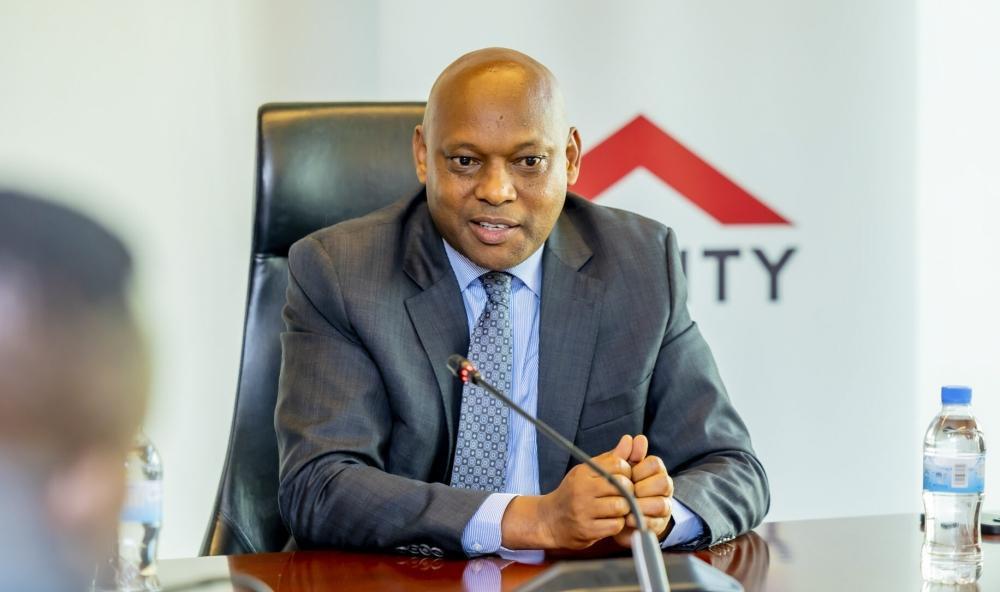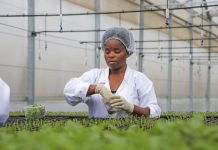Africa-Press – Rwanda. Equity Bank Rwanda Plc is emerging as a powerful engine for Rwanda’s economic transformation, channeling 90% of its loan portfolio into Small and Medium Enterprises (SMEs) and the agribusiness sector; two pillars seen as key to inclusive growth and national resilience.
In a strategic allocation of its lending resources, the bank has directed 60% of new loans toward SMEs and 30% to agriculture and livestock ventures, underscoring its mission of transforming lives and livelihoods through targeted financial empowerment.
“Our belief has always been that Africa’s growth must be driven by its people,” said Hannington Namara, Managing Director of Equity Bank Rwanda Plc. “To uplift Rwandans, we must meet them where they are and for most, that’s in small businesses and agriculture.”
The 2024/2025 financial year began on a high note, maintained by the successful merger of COGEBANQUE into Equity Bank by December 31, 2023. Namara noted that the preceding year focused on harmonizing systems, procedures, and company culture.
“We started 2024 as a new, stronger bank, equipped to serve Rwandans with a unified vision and greater capacity. This year has started strong because we built the right foundation,” he said.
That foundation is already bearing fruit. In Q1 2025, Equity reported a 36% increase in fees and commissions, a 4% rise in total assets, and a 10% increase in net profit, from Rwf15.7 billion to Rwf17.2 billion; gains largely attributed to increased lending and disciplined risk management.
Financing the backbone of the economy
SMEs, widely recognized as the backbone of Rwanda’s economy are receiving the lion’s share of financing. With loan packages ranging from Rwf1 million to Rwf20 billion, these businesses represent Equity’s most active and promising clients.
“Most of our clients are in this category,” Namara said. “Not just because they repay loans well, but because they are building the future of Rwanda.”
Agriculture, which employs over 70% of the population, also remains a critical focus.
“This ecosystem touches everyone from the farmer to the hotel chef. We’re investing in it because we understand its importance to food security, inflation control, and rural development,” Namara added.
With the integration of COGEBANQUE, Equity now serves over 1.4 million customers and operates 36 branches across Rwanda, supported by a workforce of nearly 900 employees. Its strengthened balance sheet enables it to support single-client projects worth up to USD 32 million.
“Before, a client seeking Rwf20 billion might visit five banks. Today, they come to us and get served,” Namara said.
To maintain high-quality lending, the bank has reinforced internal credit risk structures. Its non-performing loan (NPL) ratio dropped from 4.1% in 2024 to 2.9% in Q1 2025, with further reductions targeted.
“Good lending isn’t about giving out more money. It’s about doing so wisely with follow-up, support, and risk awareness,” Namara emphasized.
Equity is also investing heavily in technology. From AI-driven banking systems to remote transactions, the bank is reimagining what it means to be accessible in a digital era.
“We envision a virtual, lifestyle bank that serves clients wherever they are,” Namara said. “Our systems already integrate AI for fraud detection, customer insights, and personalized services.”
All staff, even those in accounting, are being trained in digital skills and AI to ensure the workforce is prepared for the future.
“Innovation must be anticipated not just reacted to. We’re already thinking beyond AI,” he added.
Equity’s upcoming headquarters at the Kigali International Financial Square (KIFC) is also symbolic of this transformation. Slated for phased completion between March 2026 and June 2026, the twin towers will house financial and hospitality services.
“Kigali’s transformation into a global financial hub demanded upgraded infrastructure. We’re proud to be part of that vision,” Namara said.
Tackling high interest rates
Namara addressed Rwanda’s relatively high interest rates, often between 15-20%, noting they stem from structural economic issues, such as low national savings and high cost of funds.
“If financial institutions only save Rwf1 billion, banks must compete to secure those deposits, driving up rates. But as savings grow and NPLs fall, rates will decline. We’re optimistic they could drop to 10-12% within 10–15 years,” he said.
He added that promoting a culture of saving is crucial, as many Rwandans still prioritize immediate needs over long-term financial planning.
Equity is deepening financial inclusion with 3,800 active agents and daily digital loan disbursements of up to Rwf10 billion. Namara stressed the importance of trust in the formal banking system.
“With training and support, 80% of those who attend our programs become Equity clients. By 2030, we aim to serve five million Rwandans,” he said.
Equity is also fortifying its digital defenses through Aspire, its cybersecurity initiative that includes multi-layered protections and client education.
“Every new tech brings risks. But we’re ready; with robust firewalls, training, and systems that evolve with threats,” Namara explained.
By July, Equity plans to roll out faster, more secure online banking, a new “cash cloud” for businesses, and customer-friendly insurance negotiations embedded in loan services.
“Choosing Equity is a smart decision. A student with just Rwf100, 000 in savings could later use that discipline to qualify for a home or business loan. We recognize and support ambition from the start,” he said.
Equity Bank’s blend of strategic lending, digital innovation, financial literacy, and national development ambition positions it not just as a bank, but also as a transformational force in Rwanda’s economic landscape.
For More News And Analysis About Rwanda Follow Africa-Press






